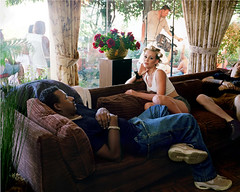You don’t have to live in Wyoming
I went to see Brokeback Mountain last night. The positive buzz around the film had succeeded in convincing me I wouldn’t like it, but it turns out that none of the reviews I’d seen actually get to what the film is, I think, really about, and so miss what makes it, in fact, such a marvellous film.
The most common reponse has been to praise the film as a universal love story, and it was this that provoked my initial hostility. I have no time for films about characters sacrificing their happiness in the face of social convention. I can’t stand The Remains of the Day, for instance — there’s nothing honorable about being the victim of pointless social norms, still less in suffering in silence. If that were all Brokeback Mountain were portraying, it would be at best banal, at worst pernicious. This universalizing interpretation has been challenged for the way it effaces homosexuality from the film, either as a criticism of mainstream responses to the film, or as a criticism of the film itself. However, inciteful as both of these essays are, I think they finally make the same mistake as the position they oppose; they read the film solely through the central relationship, thereby missing the
broader concerns which this relationship illuminates.
I’ve yet to see a review which properly addressed the specificity of the setting of the film. 1960s Wyoming has been assumed to simply represent A Place That Doesn’t Like Fags, and nothing more. But that’s untenable as an explanation of the very precise moment which is beautifully rendered in the film’s design. Far from being either universal or a love story, the film is both more specific in its location and broader in its concerns: its theme is, fundamentally, the gender dynamics of late fordism. Looking at it this way also helps explain a number of scenes which would otherwise be distinctly troubling.
There are three scenes which particularly emphasize this aspect, and against which we can then interpret the rest of the film. Shortly after Ennis gets married, we see him and his wife in their little house out on a ranch somewhere, where Alma is attempting to coax Ennis to move to live in the nearby town. This scene concened me; Alma’s pleading and wheedling portrays a prennial female stereotype, one that is doubly worrying in the context of Ennis’s attraction to the wilderness which is bound up with his love of Jack. But why accept this moralizing interpretation? We’re prepared to take Ennis’s behavior as conditioned by his social circumstances, and implicit in the film is the suggestion that we extend this perspective. Alma is no happier with the gender role she has been assigned than Ennis or Jack, or any of the other characters.
Skip forward to Ennis and Alma living in town. Ennis rushes into the supermarket where Alma works, dumping the kids with her so that he can head off to work out on the ranch. Throughout the film, Ennis uses the nominal responsibilities of his employment to assert what he thinks is some kind of agency. But is it really? At this point, is it possible to construe the wage laborer’s freedom to enter the workforce as liberation (if it ever was)? This sets up the later scene where Ennis berates Alma for leaving the house at dinner time to take on an extra shift at the supermarket. What happens to the idea of work as liberation when waged work can no longer be construed as freedom through a gendered opposition? This is not a transhistorical question, but one which arose in the specific time and place in which the film is set.
This set of issues, once seen, can be located throughout the film. We can see the complex of class and gender identities in the middle-aged and middle-class Jack’s paunch and moustache in the later part of the film; we can see it right at the beginning, when Jack and Ennis confront the power of their employer, both of them already damaged by the society they were born into (and these early scenes make it clear that the film is not about the consequences of the chance event that happens up in the mountains). This is also what makes the film so powerful as a story of class struggle (in John Holloway’s sense, as a struggle against classification). The central role of structure is made most explicit in what I think is the last scene in which we see Jack and Ennis together. Jack raises again the possibility that the two of them could live together; Ennis’s response is hyperbolic: Jack, he say, might as well imagine that the river would flow with whiskey. On one level, this looks like a simple instance of bad faith, like Ennis’s continued insistence that he can’t leave the life he knows because he needs to keep his job. But, just as the need to sell one’s labor is very real under capitalism, what Ennis’s response reveals is that, in the face of overdetermined social structures, any better future will appear to be not only contingently unattainable, but necessarily, structurally, impossible (and does Jack, finally, really believe that his utopia is any more possible?).
There is much more in the film than a love story, or even a gay love story. But it’s also worth saying that the situation which Jack, Alma, Lureen and Ennis are forced to negotiate, is not the situation we confront today.
The mountains of the moon
There’s an area of Uganda sometimes called the mountains of the moon. Among other things, it’s famous for its gigantic flaura and fauna; six meter high heather, the world’s largest elephants, that sort of thing (a perfect foil for colonialist representations of Africa, of course; I first heard of the place through Willard Price’s kinda racist Adventure series). What no-one told me, though, is that America is a kind of mountains of the moon, as well. Of course the roads and the cars are enormous; hell, our cooker is ludicrously big, and if the kitchen wasn’t such a tip right now I’d show you a picture. What’s only become apparent now that spring has more or less arrived is that the plants have the same gargantuan quality:
And a couple of other quite nice pictures of Berkeley while I’m at it:
Inspiration strikes
So, I was listening to the incredible Klezmer/Ska crossover of Klezska, and what may be the best idea I’ve ever had occoured to me. What the world is crying out for is a combination of the kneeling-and-jumping style of cossack dancing with classic running-on-the-spot ska dancing.
Tomorrows
I bought a copy of All Tomorrow’s Parties in a second-hand bookshop recently for two dollars. I felt a little bad for William Gibson; I mean, it’s not his best book, but surely a (good condition, hardback) copy of it is worth more than that. On the back, there’s a big picture of Mr Gibson, wearing a slightly outlandishly sized cell phone. A tactical error on his part, one would think—imagine if old editions of Neuromancer had featured pictures of those crazy old ’80s modems (that featured actual loudspeakers you hooked up to a phone). Although maybe they almost do. Glueboot read Neuromancer a while back and balked at the now impossibly retro character of Gibson’s future. I first read the book some time in the early ’90s, before I’d ever seen the Internet (though I think I’d vaguely heard about it, or at least about bulletin boards). When do possible futures become inaccesible, and why? What on earth are we to do with all the no-longer accesible futures that must litter the last 200 years of conceptual time?
∅
Soon it will be twenty years since I published this book in France. At that moment I was quite aware of having written a ‘great’ book of philosophy. I felt that I had actually achieved what I had set out to do. Not without pride, I though I had inscribed my name in the history of philosophy, and in particular, in the history of those philosophical systems which are the subject of interpretations and commentaries throughout the centuries.
— Alain Badiou, Being and Event
How do you know what is a “primary text,” particularly if you’ve written it? Not that I disagree with Badiou, I think it’s clear that Being and Event is, as it were, a work of philosophy rather than one of commentary. As is attested by the difficulty of reading the book, the effort required to wrap your head around new concepts. Still, it’s worth it; I’m surprised to find myself excited by, say, Badiou’s argument leading up to the axiom of the null set. (∃x)¬(∃y)(y∈x), Badiou points out, asserts only the existence of non-existence (of a negation), the barest ontological minimum.
Anyway, the Weblog’s Badiou reading group has begun (schedule).
Generic structures
California is an imaginary country. I don’t mean that metaphorically (although the facility of the metaphor is obvious). “California” was the name of a utopian island in a 16th century romance; thus the actually existing state of California is doubly mimetic, a reference to what was avowedly fictional in the first place. Hence Dreaming California at the Berkeley Art Museum, which promises to “reveal the realities and the illusions of the California dream.” The ambiguity here is interesting and runs through the exhibition: a tension is set up between realities and illusions, but both alike are “revealed”; the curators avoid asserting that revealing reality thereby dispels illusions. The suggestion, amply illustrated by the photographs on display, is that the opposition between reality and illusion is not so simple.
 Larry Sultan’s series The Valley gives us a well-worn set-up for a confrontation between reality and illusion. With a series of photographs taken between takes on the sets of porn films, we might expect Sultan to expose a gap between the glamorous fantasy of pornography and the grim reality. But that is not what we get, the signifiers of “grim” are not represented here. The films Sultan documents were shot in rented suburban houses, and what we see is the minor oppulence, the banal glamor of these mass-produced detatched mini-mansions. The true subject of The Valley becomes clear in the conjunction created by this exhibition with pictures from another series, Pictures From Home. Here, we have pictures of the same suburban housing, likewise from the San Fernando valley. But this San Fernando house is the home of Sultan’s parents. Sultan says of the two series:
Larry Sultan’s series The Valley gives us a well-worn set-up for a confrontation between reality and illusion. With a series of photographs taken between takes on the sets of porn films, we might expect Sultan to expose a gap between the glamorous fantasy of pornography and the grim reality. But that is not what we get, the signifiers of “grim” are not represented here. The films Sultan documents were shot in rented suburban houses, and what we see is the minor oppulence, the banal glamor of these mass-produced detatched mini-mansions. The true subject of The Valley becomes clear in the conjunction created by this exhibition with pictures from another series, Pictures From Home. Here, we have pictures of the same suburban housing, likewise from the San Fernando valley. But this San Fernando house is the home of Sultan’s parents. Sultan says of the two series:
I find a lot of depictions of suburban life to be quite shallow. Either they’re hypercritical, like new topographics where tract homes are seen as generic structures for generic lives, or they’re the kind of one-dimensional dramas or sitcoms that are prevalent in popular culture. Neither of these depictions get to the complex desires or longings underlying this great American dream of suburban home ownership. To me, the suburban home is a kind of projection screen for fantasies, it’s rich for storytelling.
The subject is not the fantasy of pornography, but the fantasy of suburbia. So the Larry Sultan photos hanging by the door of the gallery are a perfect introduction to the Bill Owens series, Suburbia, that makes up the second major portion of the exhibition. Owens’s great virtue here is to be able to imagine a response to kitsch other than the faux-incredulity of hipster irony. Surely no-one is really surprised at this point to be confronted with evidence that the tastes of the ’70s were wildly different from our own, making the “OMG” response to kitsch an unilluminating instance of bad faith. Owens does something more interesting, considering how what we might call kitsch actually functions physiologically and affectively. So we see the glistening red wetness of a formica toilet-seat, or a picture strewn with the naked bodies of CPR dolls. The allure of the artificial.
Or, we might say, the libidinal charge of the suburbs. What’s interesting about Owens’s collection of pictures is how it re-imagines the lack of natural, organic, community in the suburbs as a kind of blankness or possibility, and thus as a particuarly American kind of utopia. Anyone who has taken an undergraduate course on Thomas More probably had it impressed on them that “utopia” is a pun in greek, from eu-topia (good place) and ou-topia (no place). Owens inverts the sense that is usually given to this double meaning: here it is precisely the blankness of the non-place that makes it possible to imagine it as a good place. Sultan’s comment about “generic structures for generic people” should thus be re-read with “generic” in Badiou’s sense, as that which is outside the law of a given situation. The title of Owens’s picture of a group of ageing swingers points precisely to this: “We don’t have to conform.” The evacuation of anything natural or given allows for a “lawlessness” of an entirely unheroic sort, which remains utopian for all that. Inauthenticity, the lack of an identity, is also the absolute freedom which is the fantasy of the suburbs.
The complex relationships between fantasy and identity link Sultan’s and Owens’s work to the definitely non-suburban pictures of Ruth Marion Baruch, which made up the third portion of the exhibition. The two sets of photos juxtaposed here again suggest a simple reading. Comparing the department store scenes of Illusion For Sale, San Francisco with the hippie pictures of Haight Ashbury, the exhibition notes point out, shows that “the search for identity was no longer a retail experience.” Is that to contrast the two, presumably to the benefit of Haight Ashbury authenticity? Or to cynically unite them, suggesting that the hippie experience was no more than another sort of “retail experience”? Again, the photographs themselves make it hard to sustain any of these binaries. Tucked away in the Haight Ashbury pictures is a shot of a cardboard sign stuck in a window somewhere, with the legend:
If I could believe wearing beads made men hippies, I could believe removing them would make men free.
This, I think, gets to the heart of Baruch’s pictures, which neither praise nor condemn the “search for identity,” but instead begin to undo identity. Their theme is that recognizing identity as a social construct is double-edged; while it might allow us to understand identities as non-normative, it also suggests that we can never cease to produce identities through our practice. Identity is not a matter of simple choice, neither wearing beads nor taking them off. Baruch’s pictures illustrate this in a variety of ways, through the moments they capture (exceptional? typical? we can’t tell), and through the way they are framed, cramming in or excluding details, demonstrating that identity is always in part imposed. “Young blond thoroughbred” focuses on a tall, beautiful young woman; we only glimpse blurred, reaching from out of frame, the the stocky arm of the shopgirl allowing the “thoroughbred” to inhabit that identity at all. In “Woman in a black dress which is too tight,” Baruch crops the picture so tightly the constraint of the dress becomes an ontological constraint, removing anything other than this woman, her body formed by the too-tight dress.
The conjunction of Illusion for Sale and Haight Ashbury is compressed into one picture, “Filipino girl with long hair holding up bridal gown.” The picture is divided sharply down the middle. On the left, we have the girl of the title, gazing with a clear pleasure that suggests plenitude, into the right half of the frame. In that half of the picture we see, reflected like some kind of mirror which is more truthful than a mere empirical mirror, the empty wedding dress which is the object of her gaze. Again we see the pure emptiness of fantasy, but this image completes what is latent in the rest of the exhibition: the centrality of the fantasy to any subjectivity. The fantasy is not to be accepted or rejected, to be appraised as either true or false; it is an empty space to be stepped into. It is what you make of it, or what it makes of you.
Do not give up on your desire.
Contagion warning
During the Birkbeck Derrida lecture series, someone (k-punk? infinite thought?) mentioned the deconstructive virus. It’s a pretty accurate description of some of the worst Derridean writing. A mediocre scholar takes some concept (and it doesn’t matter what concept) and introduces deconstruction, which takes up residence and uses it to produce endless copies of some theme of Derrida’s, spreading the contagion and destroying the original concept.
I’ve spent the past couple of days mostly at a conference on Derrida and the Time of the Political. All the greats were there: Balibar, Butler, Brown (although not Badiou, unfortunately, who fits my alliterative schema; Ranciere, who doesn’t, was there, though). The deconstructive virus was, luckily, mostly absent (showing up only in a dubiously eurocentric talk on responsibility, and a panel on Algeria, of which the less said the better, probably). The best papers, indeed, steered clear of Derridology, starting off from Derrida’s work to look substantively at some issue only tangentially touched on by the man himself.
The best example of this was Wendy Brown’s paper, “Is There Sovereignty?” part of her ongoing work on sovereignty as the central concept underwriting the supposed autonomy of the political (an earlier iteration of which Sandy discussed a while back). She started by suggesting a contradiction between deconstruction and sovereignty, as deconstruction seeks to undermine all determinate concepts, while sovereignty will not let itself be rendered indeterminate (and, presumably, has the material force to prevent this from happening). This then renders deconstruction a necessarily anti-political procedure, creating difficulties in Derrida’s attempts to specifically deal with the political; difficulties which, according to Brown, he fails to resolve.
Democracy as a political system is where these problems are located. Democracy, as the rule of a heterogenous people, appears as the practical deconstruction of sovereignty; but as democracy is a politics it requires sovereignty to found the political in the first place. Thus, popular sovereignty invokes sovereignty as a supplement to democracy. Brown’s example here was Iraq, where the lack of any sovereignty renders the formal elements of democracy (voting, parliaments) irrelevant, while attempts by the occupiers and Iraqi military to establish sovereignty render democracy impossible in practice (Brown employed the ominous but apposite expression “Iraqization,” which I haven’t heard used before).
Derrida, Brown argued, follows the liberal tradition in locating this sovereign supplement in the state. He construes democratic freedom solely as individual self-determination, and so displaces politics in common onto the sovereign state, which is capable of coercing individuals to live together. However, as we have seen throughout history and are again seeing clearly, this understanding is insufficient to produce substantive democracy. Brown’s conclusion, and it was pleasing to hear her say this explicitly, was that, in his rejection of collective self rule, Derrida is not communist enough.
Jacques Ranciere was similarly critical of (though not hostile to) Derrida. He began by reiterating his claim that democracy is anarchic, in the sense of resisting αÏ?χε, authority, or any principle which dissymetrically allows some to rule over others. The δημοσ is those people who have no qualifications to rule, and thus democracy is the rule by those without qualifications. Therefore, the δημοσ is a supplement to the political structure; it is that which is not counted by the political system.
Where this becomes a criticism of Derrida is when we turn to Derrida’s account of the political subject; or, Ranciere insisted, Derrida’s failure to account for the political subject. Ranciere argued that Derrida’s explicit attack on a politics of fraternity also functions as a way of avoiding thinking the politics of equality, because Derrida allows for no substitutibility, no way of thinking that the other could be any other, that is, the uncountable others who make up the δημοσ.
What I thought was most interesting, however, which this critique doesn’t get to, was Ranciere’s positive conception of the political subject. A political intervention occours, Ranciere said, when a group takes the part of the δημοσ. The political subject acts as if it were the indeterminate, uncountable part of the political community. This has obvious affinities with Badiou’s account of the subject, but I’d be interested to see how exactly the two can be related.
Other interesting things included Pheng Cheah’s discussion of “Democracy to come,” which, somewhat in contrast to Ranciere’s criticism, argued that, because democracy is never self-identical or properly present, the democracy to come is not something to be put off to the future but exists in an untimely manner in the present. The Marxism Working Group organized a talk on Wordsworth and the commodity form, which I’m not really equipped to judge, but it seemed pretty interesting (and a good complement to our ongoing Grundrisse reading group).
wages for housework…
File this under “betcha didn’t see that coming” - Hugo Chavez, in a recent speech, essentially instituted a modest wages for housework program:
The role that housewives play in the economy and the nation also needs to be rewarded said Chavez. Beginning this summer, 200,000 poor homemakers will each receive roughly $200 (372,000 Bs) a month.
Chavez said, “These mothers work a lot, ironing, washing, preparing food, cleaning and bringing up kids.� More money has been set aside for the project and the number of beneficiaries could quickly rise above half a million.
Which women would receive the money would depend on several conditions. These include marital status, how many children they have, their living conditions and already existing levels of family support.
The measure is an outgrowth of Venezuela’s 1999 constitution, whose article 88 specifies that the constitution recognizes household work is economic activity that produces wealth and well being. Also, according to this article, since it is economic activity, homemakers have the right to a pension.
It should be noted that this amount is fairly significant, equivalent to about minimum wage. Perhaps autonomists might be convinced to abandon their dogmatic anti-Third-Worldism (read: Eurocentrism)?
“I’d make Coretta Scott King mayor of all the cities”
Tzuchien quotes a great piece of utopianism from The Coup:
And if we win in the ages to come
We’ll have a chapter where the history pages are from
They won’t never know our name or face
But feel our soul in free food they taste
…
Retail clerk - “love ballads� is where you place this song
Let’s make heaven right here
Just in case they wrong
Another great utopian track, of course, is ‘If I Ruled the World’. Listening to it recently, it made me wonder about cockaignes, those impossible countries of luxury and idleness. They’re usually understood in terms of a simple version of Bakhtin’s carnival, where the central trope is inversion: the master becomes the slave, and the peasant a king. But I wonder if there isn’t something more subtle going on in the incoherence of the cockaigne. Perhaps the point isn’t so much inversion as an impossible, mad, insatiable juxtaposition of different elements. Hence Nas combines that the faintly foolish and personal with the eminently serious and political, as if there were no distinction between the two:
I know it sounds foul but every girl I meet’d go downtown
I’d open every cell in Attica send ‘em to Africa.
I wonder if part of this incoherence is an attempt to illustrate what Foucault called “the stark impossibility of thinking that,” an enactment of the way in which revolution would have to not only reorder the empirical distribution of things, but overflows the basic conceptual grid that makes this empirical order possible.
Paging Dr Fanon
Jessica has new quality from Fefe Dobson. Interesting title, “As a Blonde,” given that Dobson is black. Explicitly, the lyrics position “blonde” as simply a difference of no intrinsic importance, another alternative for Dobson comparable to her desire to “try a different lipstick on.” But the way the fantasy of being blonde is figured suggests something more is going on, something involving privilege. The blonde Fefe Dobson would “never have to watch [her] weight,” for instance, and further:
Wave my magic wand
As a blonde
Will I get whatever I want?
I’ll be ever so enticing
Down a lot of ice cream
Never even wipe my face
The track’s got a great Ramones sort of feeling to it, too.









